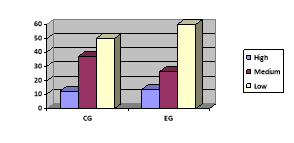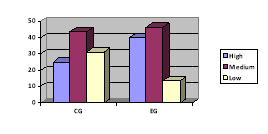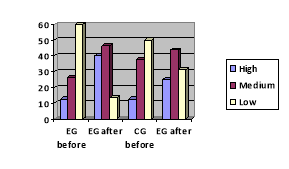The main goal of the «State Program for the Development of Education in the Republic of Kazakhstan for 2011–2020" is to increase the competitiveness of education [1]. Improving the education system plays an important role in achieving this goal.
In a rapidly changing world, increasing flow of information, students should not only master the amount of knowledge and skills, it is much more important to cultivate in them the ability to independently extract, analyze, structure and effectively use information to maximize self-fulfillment and useful participation in society, meaningful problems [2].
At the same time, the content of the training programs will be reviewed in such a way as to pay more attention to the development of the competencies needed in life and profession, such as communicative and professional competences [3].
For example, in the State Mandatory Standards of Education in 2014 for bachelor and master's degrees in the requirements for the level of education of graduates are also included Requirements for socio-ethical competence, Requirements for professional competence. Below there are some requirements for socio-ethical competencies:
– to be able to orient adequately in various social situations;
– to be able to work in a team, correctly defend one’s point of view, offer new solutions;
– to be able to find compromises, to correlate one's opinion with the opinion of the collective;
– to comply with the norms of business ethics, and have ethical and legal norms of behavior.
In our opinion, the most acceptable means is the exchange of thoughts and ideas in the course of interactive communication in solving various tasks and problems, which, in turn, is the most productive way of stimulating the thinking and speech activity of students of medical specialties. It is possible to carry out this in the educational conditions only in the process of discussion, discussion, dispute. There arises the problem of the ability to participate in these types of interactive communication, in other words, the problem of discussion skills as a tool for solving problem situations.
The works of the following researchers are devoted to the discussion: D. D. Dzhantasova, S. K. Sansyzbaeva, V.Zh. Sarsekenova, S. B. Omarova, E. S. Amandieva, N. O. Balakina, Zimnyaya, V. K. Ivanova, I. G. Morozova, I. A. Najafova, M. V. Clarina, R. P. Milrud, E. I. Passova, I.Ya. Lerner, V. A. Malakhova, S. K. Folomkina, N. I. Almazov, M. G. Debolsky, G. Bedley, R.Gardner, P. Greber, D. Johnson and R. Johnson, S. Lundsteen, M. Long and P. Porter.
The discussion, being a form of polylogic speech between two or more subjects, refers to socially-oriented communication. In this paper we take the educational discussion as a basis, where the goal is not only the opportunity to prove one's point of view on the problem, but also the achievement of a compromise, by expressing one's arguments in a foreign language.
To develop the discussion skills of the first-year students of the medical university, the model of the disciplinary skills, developed in the thesis «Development of the discussion skills for foreign language lessons with the use of critical thinking technology» was used in the course of the experiment [4].
During the research work, the method of diagnostic and control measurements, the experimental method, the method of statistical data processing were used.
The model assumes four stages of development of the discussion skills using the technology of critical thinking, each of which is aimed at the formation of certain knowledge and skills.
The complex of exercises proposed by us corresponds to the tasks of each stage and is aimed at their effective achievement.
At the cognitive-accumulating stage, we propose the following methods and techniques: Brainstorming; cluster; true / false statements; tables; listing; «Choose your position».
At the cognitive-strategic stage, we offer such methods and techniques: Problem-solving questioning; pros and cons; fact / opinion; general / specific; cause / effect; analysis.
At the communicative-tactical stage, we propose the following methods and techniques: Making argumentations; prove your view-point; create solutions.
The reflexive-evaluation stage is focused on the formation of the reflective-evaluative activity of students.
The main features of the proposed exercises and tasks are the orientation toward the formation and development of the discussion skills, as well as the use of critical thinking, which presupposes the focus of activity on preparing students for communication in future professional practice. It means that students not only master the skills to correctly and constructively discuss and defend their point of view, but also get able to use these skills later in life.
According to the modern model, the experiment included the following consecutive stages: ascertaining experiment; forming experiment; control experiment;
In the process of planning and preparing experimental training at the preparatory-organizational stage, we had to conduct a pre-experimental diagnosis of the students' discussion skills.
The initial level of English language training by the results of the basic test was approximately the same for all students, that is shown in Table 1.
Table 1
Initial level of English language training in CG and EG
|
Group number |
Group |
Distribution by experiment group |
Average score of the basic test |
Total number of students |
|
1 |
1025 GM |
CG |
65 |
16 |
|
2 |
1033 GM |
EG |
70 |
15 |
The task of pre-experimental diagnostics was solved with the help of a communicative situation of a problematic nature on the topic: «Holidays. Travelling ", to determine the level of formation of the discussion skills.
Students were defining the nature of the problem in groups, analyzed the problem, discussed the sources of information, collected and carried out the search for the necessary information, planned their activities, distributed the duties of each student for the discussion, made a decision, led the discussion, investigated, processed, analyzed the results of the work. In the process of monitoring how students coped with the task, there was a record of indicators of the level of formation of the disciplined skills. As an assessment of the formation of the disciplinary skills, students used the following criteria: at the cognitive-accumulative stage — the adequacy of the formulation of goals and problems, consistency in establishing cause-effect relationships between facts and phenomena, awareness of the selection of material on the problem of discussion and ways of its processing; on the cognitive-strategic stage — an integrated approach to solve the problem, the originality of the way to solve the problem, the consistency of the planned steps; at the communicative and practical stage — the adequacy of linguistic style (the corresponding language formulas), the students' realization of their communicative intentions (to justify, convince, prove, argue, reason, reach the goal, consistency of reasoning); at the reflexive evaluation stage — the completeness and objectivity in the implementation of self-reflection, the ability to perform self-correction, the ability to effectively use the resources obtained in solving problems.
Due to the individual characteristics, not all the students have the same level of formation of the discussion skills, so we assumed the possibility of several levels of formation of the disciplined skills: high, medium, low.
The results of the ascertaining experiment conducted among the first-year students of the Karaganda State Medical University showed that the level of formation of the discussion skills in both groups is approximately at the same level. Data reflecting the levels of formation of the discussion skills in CG and EG is presented in Table 2.
Table 2
Levels of formation of the discussion skills in the CG and EG
|
Levels |
Tested students (%) |
|
|
CG |
EG |
|
|
High |
12,5 |
13,5 |
|
Medium |
37,5 |
26,5 |
|
Low |
50 |
60 |
The analysis of the results of pre-experimental diagnosis in the experimental group showed that the learning groups are approximately at the same initial level of the formation of the discussion skills in studying a foreign language. The data of the pre-experimental cut in the form of a communicative situation make it possible to conclude that a low level of the formation of discussion skills predominates. The diagram also shows that the indicator of the formation of the discussion skills is approximately on the same level in both groups. The foregoing results of the pre-experimental cut enable us to draw the conclusion about the need for a purposeful formation of the disciplinary skills using the technology of critical thinking. The data are reflected in Fig. 1.

Fig. 1. Levels of formation of discussion skills in CG and EG
The next step in the experimental work was the forming experiment.
The main task of communication is the formation of discussion skills based on the produced methodological model, as well as checking its effectiveness in the process of teaching English. Training in the experimental group was built in accordance with this model.
The training in the control group was based on the same material as in the EG; however, the discussion skills were formed according to the traditional pattern: at the introductory, main, final stages students were given tasks of a problem nature. The purpose of the experiment was to establish the level of formation of the disciplinary skills and to determine / ascertain the didactic effectiveness of the model.
The postexperimental section indicates an increase in the results in both groups. In Table 3 we can see the results of the pre-experimental and postexperimental sections in EG and KG.
Table 3
Levels of formation of the discussion skills at the control stage in the CG and EG
|
Levels |
Tested students (%) |
|
|
CG |
EG |
|
|
High |
25 |
40 |
|
Medium |
43,75 |
46,5 |
|
Low |
31,25 |
13,5 |
The analysis of the indicators of the level of formation of the skills of the students in the experimental group shows a significant decrease in the indicators of a low level by 46.5 %. In the experimental group there is also an increase: 46.5 % of students are at the middle level and 13.5 % at a high level.
There were no significant changes in the control group. If at the beginning of the experiment 50 % of students were at a low level, by the end of the forming experiment their number decreased insignificantly: at a low level of 31.25 %, on average 43.75 % and at high level — 25 %.
Dynamics of changes in the level of formation of the skills of the students in the experimental and control groups can be presented in the following Fig 2.

Fig. 2. Dynamics of changes in the levels of formation of discussion skills in CG and EG
In our opinion, such a picture was the result of the application of the model produced by us for the formation of disciplinary skills, the implementation of this model allowed the students to improve their results in comparison with pre-experimental ones. Fig. 3 demonstrates the data on the levels of formation of the discussion skills in the ascertaining and control experiment in the control and experimental groups.

Fig. 3. Dynamics of the growth of the levels of the formation of the discussion skills in CG and EG at the ascertaining and control stages
Based on these results, it can be concluded that without a purposeful, specially organized activity on the formation of discussion skills using the technology of critical thinking, it is impossible to develop these skills.
References:
- The State Program for the Development of Education of the Republic of Kazakhstan for 2011–2020.
- S. S. Kunanbaeva Modern foreign language education: methodology and theory. -Almaty, 2005. — 264 p.
- Strategic development plan of the Republic of Kazakhstan until 2020.
- S. A. Astrakhambetova Development of discussion skills on the foreign language lessons with the help of critical thinking technology.- dissertation, Karaganda, — 2016.







